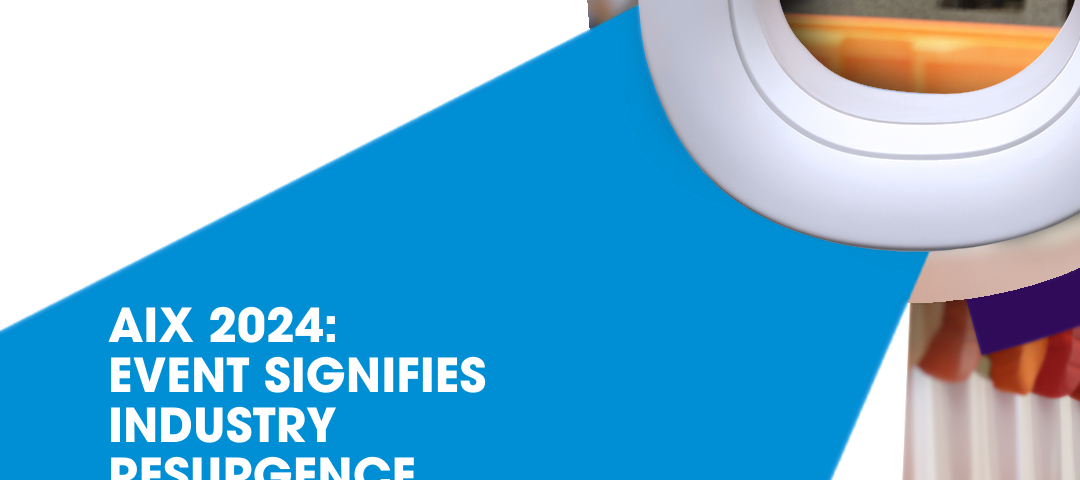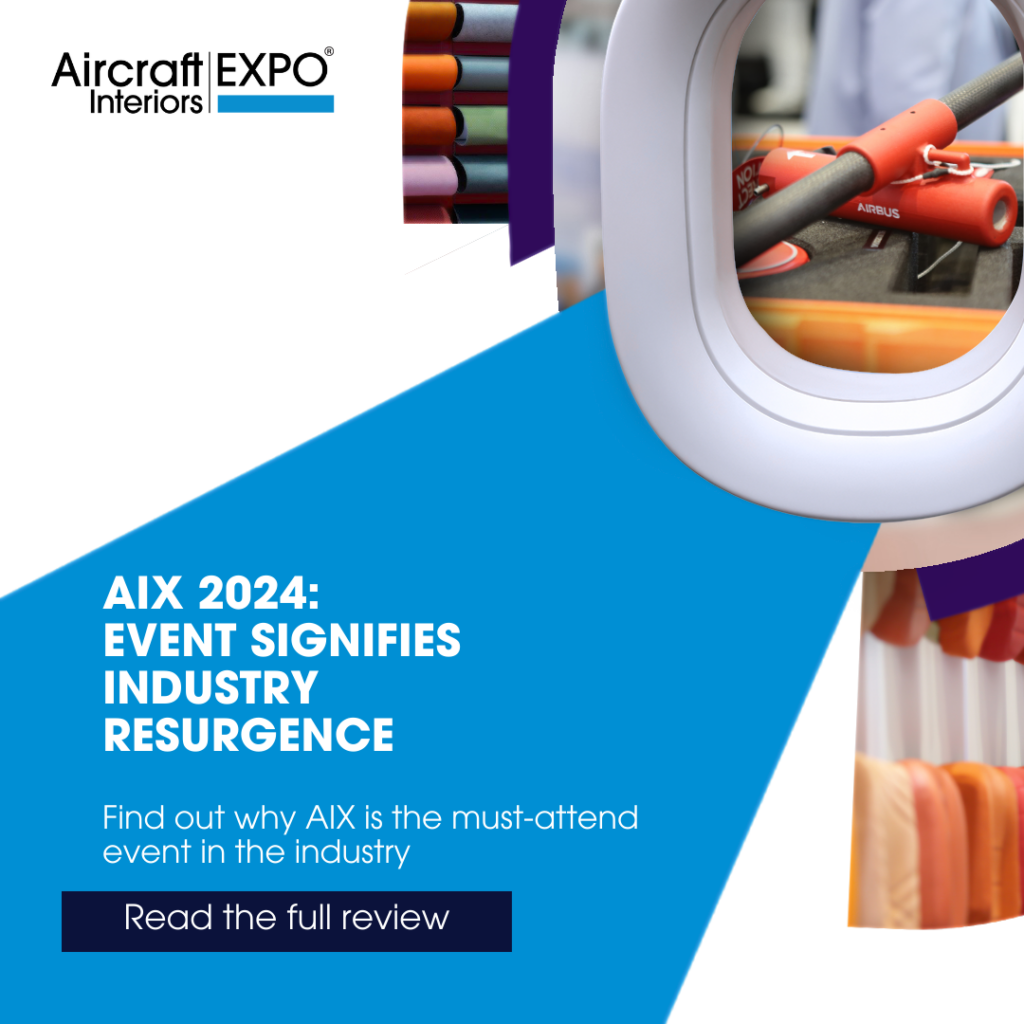
Aircraft Interiors Expo (AIX) came to a close on Thursday, 30 May, after welcoming 12,817 attendees from across the globe – a 22% increase on 2023. Across the three days, representatives from 166 airlines joined the event to find new products and services to enhance their cabin interiors.
The 2024 event was met with acclaim as attendees echoed sentiments of inspiration and that “AIX is back” and exceeding pre-pandemic levels.
Felipe Amorim, Cabin Avionics Engineer at Delta Airlines, said: “[It’s] great to see what’s out there right now in the industry, specifically scoping out the latest innovations in IFE, lighting, and electrical components in general. We’ve had some really beneficial conversations – [it’s] been good to put some faces and names. I’d recommend the show to my peers, it’s overwhelming in the best way.”
Meanwhile, Lauren Kenealy, Marketing Director at Tapis Corporation, said: “Every year tops the last somehow. This is my third show, and it’s been super to maintain and grow these relationships and see familiar faces each time we come. We’re already looking forward to next year.”
Product launches across the event
AIX 2024 began with major announcements from exhibitors, including Panasonic Avionics and Collins Aerospace, who jointly unveiled MAYA, a transformative next-generation business class suite concept. MAYA combines the two companies’ respective expertise in design, technology, and integration into a singular integrated solution, providing a clear differentiator for the business class cabin by redefining comfort, passenger immersion, accessibility and sustainability for the future of air travel experience.
Panasonic Avionics noted that the featured Astrova Curve 45-inch ultra-wide, ultra-high-definition curve screen with an OLED display and headphone-less audio system is three times larger than typical business class screens and is in the same 21:9 screen format used in cinemas.
Safran also showcased its RAVE IFE system, a set of new cloud-based services that will drive its next generation of IFEC, branded under the banner of RAVE Cloud Services. The system is designed to move large volumes of data to and from aircraft, as well as process and store large data onboard the aircraft.

Leading aircraft seating manufacturer, Recaro, introduced its new seat naming system, aligning it with the wider Recaro brand and featuring names from R1 to R7 to represent the diverse classes and intricacies of their seating solutions. Its R Sphere seat, a seating concept that uses sustainable materials such as cork, wood, recycled fishing nets, and cactus, was also showcased and secured the runner-up place in the Crystal Cabin Awards (CCA) Sustainable Cabin category.
Later, Airbus unveiled its airspace interior for the A330neo, in a first full-size mock-up on the show floor. The interior design now features a new Hero Light and Welcome Panel, along with a range of new linings, door frame panels and windows.
It also showcased the A321xlr – a “game changer” design, bringing a wide-body aircraft feel to a narrow-body. Leading aviation leather supplier, Muirhead announced its chrome and heavy metal-free FreeTAN® tanning solution with FR technology and free from heavy metals, chrome, and glutaraldehyde. The Scotland-based manufacturer has fully replaced its existing tanning chemistry with compostable technology, marking a significant stride in its commitment to eliminating the use of fossil fuels, oil-based elements, and heavy metals from all its operations and products.
The leather, already seen on selected British Airways flights, was showcased to the public at the show for the very first time.
Thales revealed its new FlytEDGE digital IFE solution, which leverages its award-winning Onboard Data Center and a partnership with Netskrt Systems to enable cloud-based content management and onboard edge caching, with a view to facilitating streaming content partnerships, and improving the passenger experience.
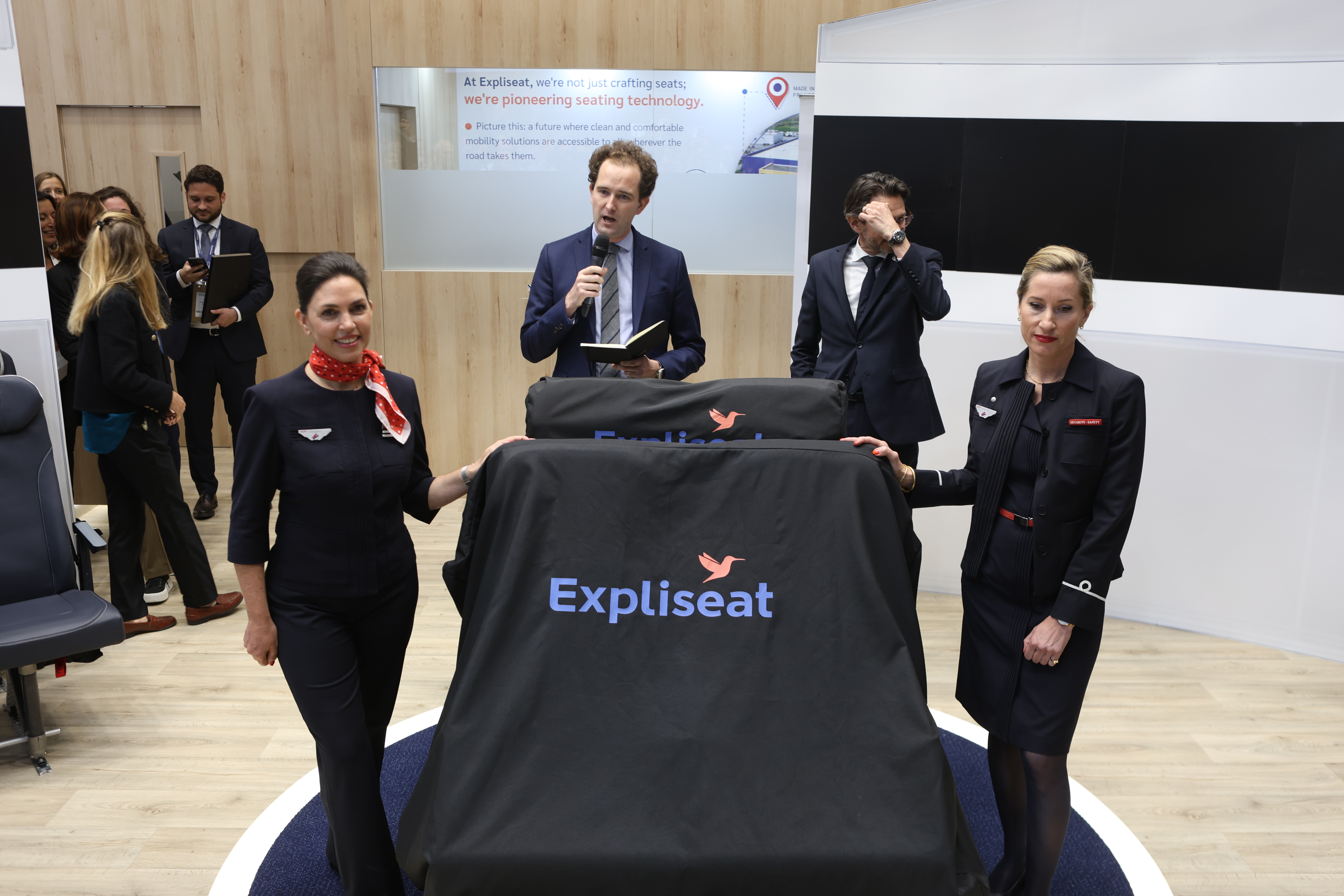
Paris-based aircraft seat manufacturer, Expliseat, known for producing the world’s lightest range of commercial aircraft seats, attracted swarms of crowds as it revealed its all-carbon-and-titanium structure, TiSeat 2x, designed for Air France. The seat will be making its debut on Air France flights this autumn as part of the airline’s cabin renewal program for its regional subsidiary’s Embraer E190 fleet.
Across the three days, a total of 458 companies showcased their solutions to international airlines looking to create their cabins of the future. This included 63 businesses that joined the event for the first time, such as SleeperTech – an Australian manufacturer and supplier.
It launched a brand-new patented product, SleeperSeat, that aims to redefine passenger comfort and experience in economy-class cabins. Combining a reclining backrest with an articulated headrest and thigh support pad, the pioneering solution gained attention from seat manufacturers and airlines alike as previously unattainable comfort was functionally provided.
The PEC trifecta
The Passenger Experience Conference (PEC) commenced on Monday, 27 May, the day before AIX opened, welcoming visitors for one full day of speaker sessions and panels discussing the future of passenger experience innovation and solutions.
The day began with a plenary session led by Professor Peter Vink from Delft University of Technology; Jochen Werner from Airbus; Melanie Berry from Iberia; Glenn Johnson from Collins Aerospace; and Seth Miller from PaxEx.Aero. ‘Innovating Tomorrow’s Travel Experiences’ set the tone for the conference, emphasising the importance of envisioning solutions to current travel frustrations and meeting the evolving needs of future travellers across the aviation sector.
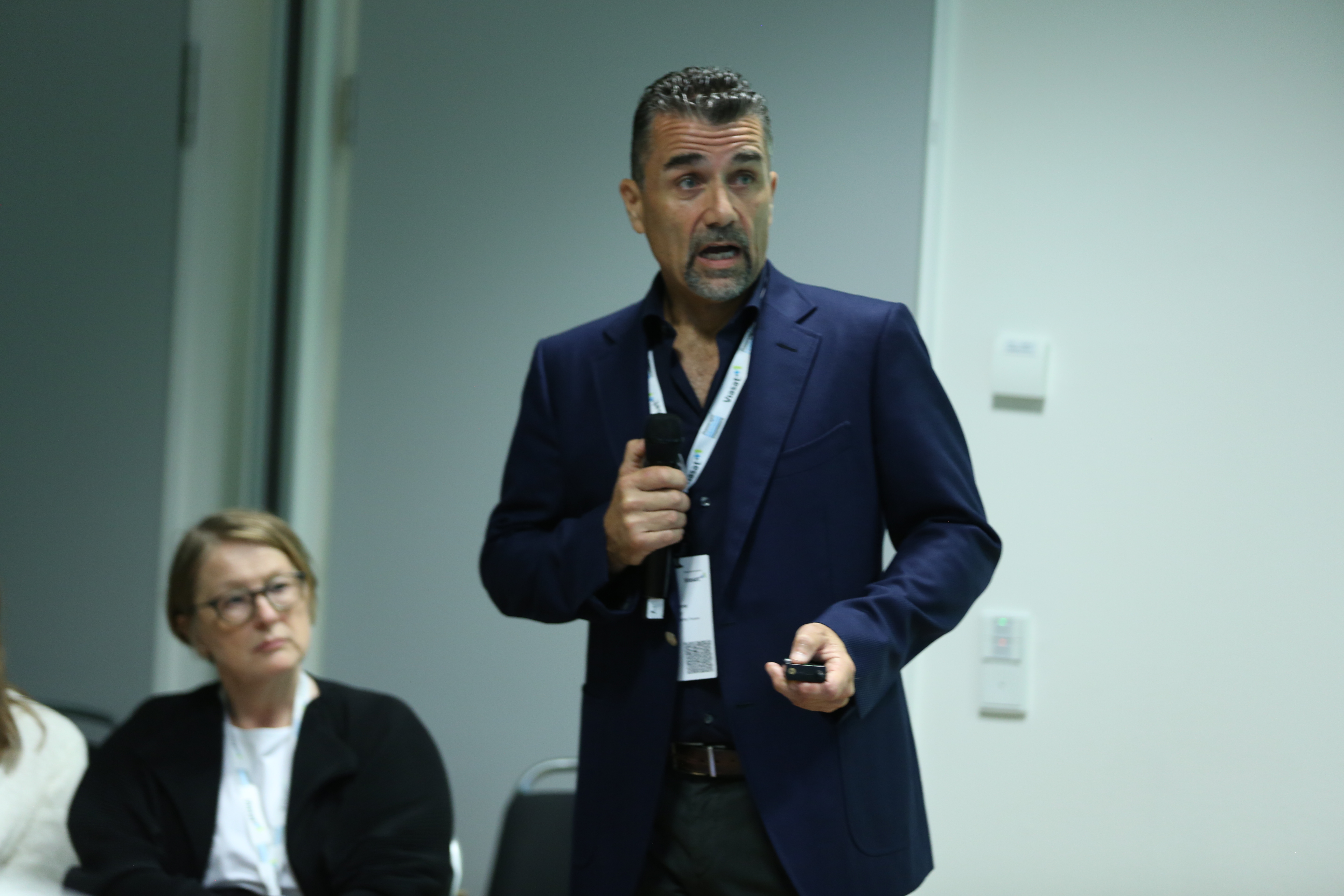
The conference then divided into three streams: Future Connected, Future Now, and Future Efficient, delving into the most pressing topics concerning the industry today; innovative approaches to accessibility, the potential of technologies and AI in enhancing passenger experiences, strategies to minimise the environmental impact of cabin operations, plus many others.
In Future Now, the session, ‘Removing the Roadblocks to Accessible Travel,’ explored how current initiatives can drive significant changes in travel, promoting new experiences and business methods. Moderated by Glenn Johnson, Senior Technical Fellow at Collins Aerospace, the discussion included insights from industry leaders on enhancing accessibility in aviation.
Eric Ezell, Head of Cabin & Cargo Innovation at Airbus, emphasised the importance of learning from other industries like trains, buses, and public buildings to introduce effective accessibility measures on board, while Brenna Wynhof, Regional Director of Cabin Marketing at Boeing, highlighted the need for collaboration across the aviation sector to achieve accessibility goals.
Over in Future Connected, the panel session, ‘The Challenges and Opportunities of Data Sharing in Aviation’, addressed the need for improved information sharing between travel partners to create frictionless and connected passenger experiences.
Tim Sommer, Vice President Head of Connected Aircraft Programme at Airbus, Michael Wolters, CEO of Banbutsu, Simon Nowroz, General Manager at Beyond, and Kei Sugimoto, Senior Director, Product and Service Development of Japan Airlines, explored strategies to ensure data is used to its fullest potential and build trust between companies within the aviation ecosystem and ways to dismantle barriers to data utilisation.
In the final stream, Future Efficient, Matt Crane, Founder of the Aviation Sustainability Forum (ASF), spoke on the significant issue of cabin waste and its far-reaching environmental and economic impacts in his session, ‘An Opportunity Too Big to Waste’. Crane introduced the ASF and touched on how food waste alone costs the industry over USD $5.9 billion annually, with an additional USD $0.5 billion in disposal costs.
The aviation industry “generates millions of tonnes of waste annually” which is a figure “expected to double by 2050 with the increase in air travel and aircraft numbers,” he said.
Countless opportunities for knowledge sharing
With the fitting backdrop of Hamburg, an epicentre of technology and innovation, the show was a vibrant hub for knowledge sharing and information exchange. CabinSpace Live, the dedicated theatre to discuss the cabin of tomorrow and beyond, continued to showcase visionary ideas.
Taking place on Tuesday, 28 May and Wednesday, 29 May, leaders and experts from Valour Consultancy, Iberia, Hughes, Axinom, Burrana, Flydubai, plus many more, took to the stage for informational sessions and panels covering IFE, cabin interiors, business jets, sustainability, accessibility and connectivity.
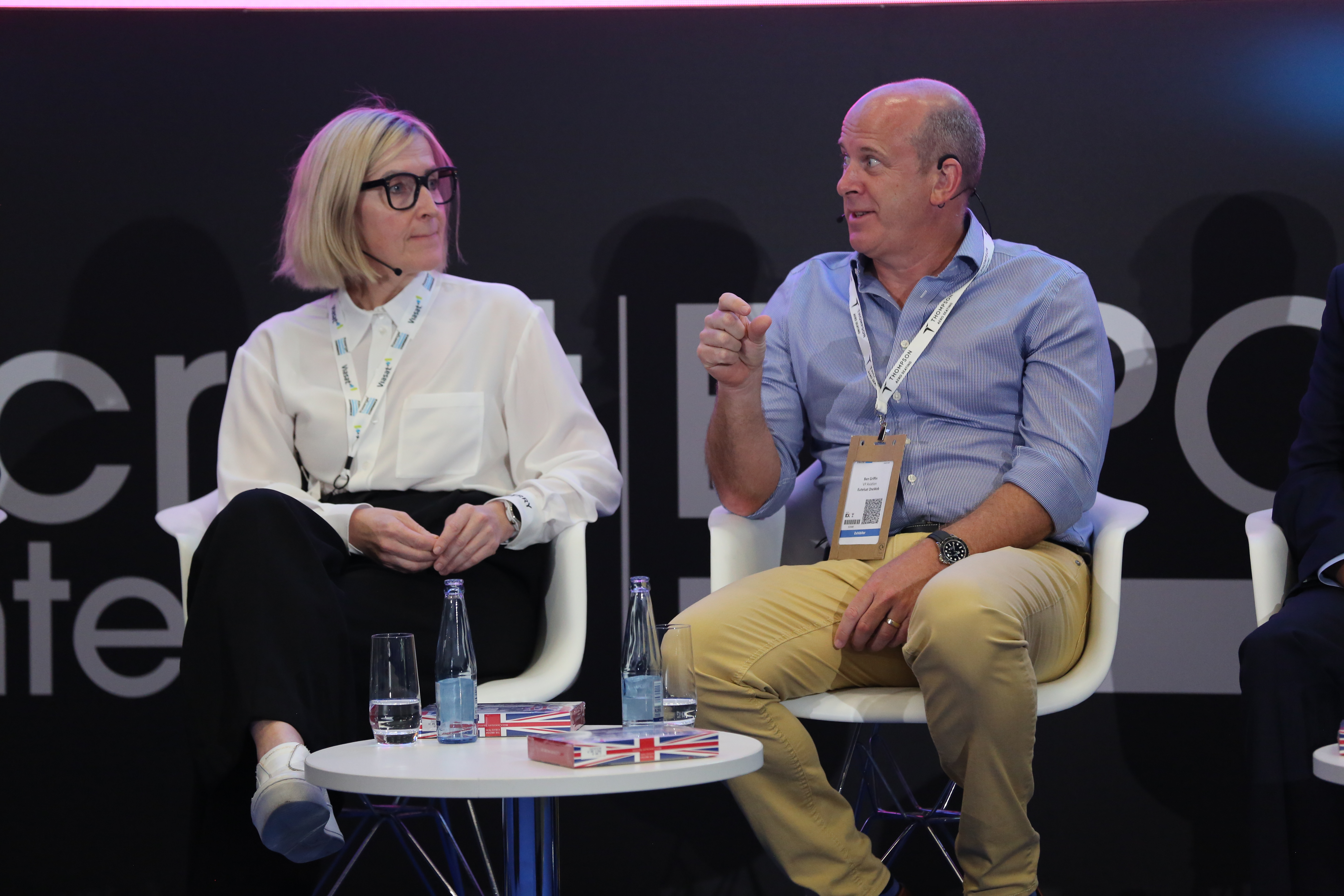
Discussing the exciting future of aircraft cabins, highlighting new and improved onboard concepts and products in the session, ‘New Era: The Fascinating Future of the Aircraft Cabin’, was Ralph Wagner, Co-Founder and CEO of Axinom; David Pook, Vice President of Burrana; Duncan Jackson, President of FlightPath3D; and Mats-Omri Schumacher, Head of Product Management at AerQ.
Jackson shared his thoughts on the future of aircraft cabins, predicting that 30% of the audience will experience vertical take-offs (VTO) at some point in their lifetime and noted that we are likely “the last generation needing explanations for basic internet functions”.
Schumacher focused on the potential of applications learning from each other to enhance passenger experiences. Additionally, he envisioned personalised offers tailored to passenger preferences, such as exclusive concert tickets offered to a Taylor Swift fan flying to New York City.
Other sessions included ‘Cabin Refurbishment: Investing to Impress’, sponsored by HMG Aerospace. Here, moderator Jennifer Coutts-Clay, Author at Jetliner Cabins, was joined by David Rice, Managing Director at Optimum Aero; Melanie Berry, Director of Customer Experience at Iberia; Jacobo Mesta, CEO of Soisa Aircraft Interiors; and Daniel Kerrison, SVP Inflight Operations at Flydubai.
The session began with panellists discussing memorable cabin refurbishment programmes before they delved into the question of measuring ROI and achieving customer validation. Closing the discussion, Coutts-Clay shifted towards the future, with panellists exploring how to incorporate a more personalised experience into the cabin during future cabin refurbishments.

On Wednesday, 29 May, a Women in Aviation Panel and Luncheon, held by global communications company, Viasat, and led by female executives, focused on the evolving landscape of the travel industry, with a particular emphasis on personalisation, seamless travel experiences, the role of AI, leadership, and Diversity, Equity, and Inclusion (DEI). Leaders from Delta Airlines, Icelandair, and Viasat discussed the importance of customer loyalty and a frictionless travel journey.
While AI is being evaluated as a valuable tool for reputation management and customer service optimisation, concerns were raised regarding privacy and its potential negative impact on the human element of hospitality onboard. The discussion also highlighted the need for airlines to develop AI solutions tailored to specific parts of the passenger experience, and for suppliers to create solutions that support airlines’ operational needs.
On the topic of female leadership, the importance of building strong teams, authenticity, resilience, and adaptability was emphasised by the three leaders.

Polly Magraw, Event Director of AIX and WTCE, said: “This year saw the numbers of attendees increase not only on the previous year but on pre-pandemic levels, demonstrating that airlines around the world are looking for innovative ways to improve the cabin experience.
“Familiar faces and newcomers alike contributed to one of the most dynamic environments we have ever seen, with so many unveilings and product launches that remind us once again that AIX is the leading event for the aircraft interiors industry. We look forward to next year to see the next generation of cabin interiors solutions.”
Aircraft Interiors Expo 2025 will return to the Hamburg Messe, Hamburg, Germany, from 8-10 April 2025.

